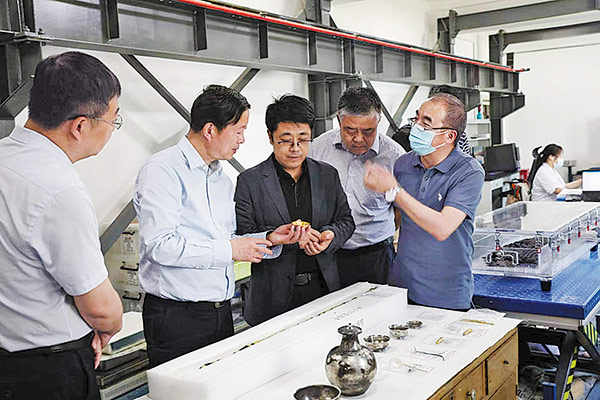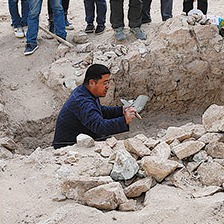An ancient metal urge


"Archaeology has trained me to be hardworking, improved my ability to endure hardships and solve various problems. These are the gifts the work has endowed me with," says Chen.
In recent years, some of Chen's most important work has been the protective excavation of a number of tombs belonging to the royal family of Tuyuhun khanate, a contemporary of the Tang Dynasty (618-907), especially that of Murong Zhi, a son of the last Tuyuhun monarch, who is also a grandson of Tang emperor Li Shimin.
Discoveries by Chen and his colleagues include the earliest known white wine and well-preserved stationery, especially the only Tang-era writing brush ever found in China.
Qi Dongfang, a professor at the School of Archaeology and Museology at Peking University, told Cover News, "We have never found such well-preserved stationery at an excavation site. In my memory there were some good inkstones found, but writing brushes, ink or paper are very hard to preserve."
"The structure of the tomb, alongside numerous funerary objects like warrior figures, a wooden bed and folding screens, have distinctive Han cultural style. Meanwhile, other features, like the site selection and animal sacrifice reflect a nomadic culture. The tomb is a mixture of diverse culture. It indicates some of the cultural exchanges that took place at that time," says Chen.
Excavation of the Tuyuhun tombs was listed as one of China's top 10 new archaeological finds of 2021.
Now, as head of Gansu Provincial Institute of Cultural Relics and Archaeology, Chen finds it stressful to balance academic research and management of the institute. He is trying to integrate his own development with the growth of the institute.
"After being engaged with archaeology for more than 20 years, it has become my mission to study it. I realize the sharing of our academic results lags behind. I hope we will improve that, so the general public can learn more about our progress and perhaps gain from it," says Chen.





































